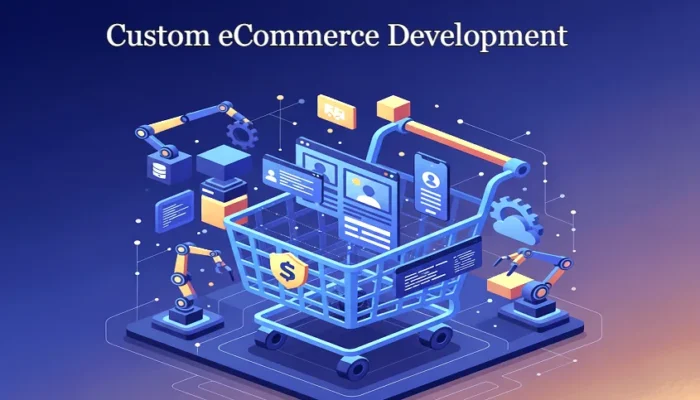
Every business has its own story, its own rhythm, and its own audience. So why should your online store look or function like everyone else’s? In the age of personalization, custom eCommerce development has become the secret ingredient behind powerful, brand-driven online stores that feel authentic and perform flawlessly.
Instead of squeezing your products and brand identity into pre-made templates, custom development lets you build from the ground up — exactly the way you want. Whether you’re running a boutique clothing label or managing an enterprise-level operation, custom eCommerce website development gives you control, flexibility, and the freedom to grow without limits.
What Is Custom eCommerce Development?
In simple terms, custom eCommerce development means creating an online store that’s completely tailored to your business model — not a one-size-fits-all solution. It covers everything from design and functionality to backend systems and user experience.
When you invest in custom eCommerce web development, you’re building a platform that works exactly how you need it to. It can handle complex inventory, support multilingual customers, or integrate with your existing CRM or ERP software. With custom eCommerce software development, you don’t just get a website — you get a fully adaptable digital foundation that evolves with your company.
Why Choose Custom eCommerce Website Development?
Using platforms like Shopify or WooCommerce is fast and convenient, but at some point, their limitations show. You may want features they can’t provide or more control over branding and SEO. That’s where custom eCommerce website development outshines pre-built solutions.
1. Your Brand, Your Rules
Templates can’t capture what makes your brand different. Custom design ensures every color, image, and layout aligns with your story. From the moment visitors land on your homepage, they should feel they’re in your world — not another cookie-cutter store.
2. Built Around Your Business
Every company has unique workflows. Maybe you sell customizable products, manage subscriptions, or rely on regional pricing. Custom eCommerce development services let you design features that match your business perfectly — no more workarounds or third-party patches.
3. Better Performance and SEO
Pre-built themes often come with unnecessary code that slows down loading time. Custom-built sites are optimized for speed and search visibility. Faster pages keep shoppers engaged, and clean code makes it easier for Google to rank you higher.
4. Scalable and Future-Ready
As your product catalog expands or your traffic spikes, your site can grow along with it. Scalability is built in from day one.
5. Enhanced Security
Use good platfoem to secure your website data and website necessary operations— SSL encryption, fraud prevention tools, and custom access controls that safeguard your data and your customers’ trust.
What Do Custom eCommerce Development Services Involve?

Working with professionals who provide custom eCommerce development services is a collaborative process. It starts with listening, learning, and understanding your goals before writing a single line of code.
a) Discovery and Strategy
Every great build starts with research. Developers study your audience, analyze competitors, and define key features your website will need. This phase shapes the roadmap for design and development.
b) Design (UX/UI)
Here, ideas come to life visually. Designers create layouts that not only look stunning but also guide users smoothly from browsing to checkout. The focus stays on intuitive navigation, fast performance, and conversion-driven design.
c) Backend and Frontend Development
Developers then start coding the site. The frontend determines what visitors see, while the backend powers everything behind the scenes — databases, order systems, and integrations. Together, they create a seamless, stable shopping experience.
d) Custom Feature Development
This is where the magic happens. Features like advanced filters, real-time shipping calculators, loyalty programs, or AI-based recommendations are built specifically for your store. Custom eCommerce software development gives you full freedom to innovate without depending on plugins or third-party apps.
e) Payment and Security Systems
Developers integrate secure payment gateways and encryption to protect data. Whether it’s credit cards, wallets, or PayPal, customers should feel safe when purchasing.
f) Testing and Quality Assurance
Before launch, your site goes through detailed testing — load times, cross-browser checks, mobile responsiveness, and payment flow — everything is tested, refined, and perfected.
g) Launch and Continuous Support
Once live, your custom eCommerce development services partner continues to monitor, update, and enhance the site. Continuous improvement keeps your store running smoothly as technology evolves.
Benefits of Custom eCommerce Development
Choosing custom development means investing in a solution designed for long-term success — not just short-term convenience.
1. Unique Customer Experience
Your website feels personal because it is personal. Everything — from homepage visuals to checkout — is designed with your specific customers in mind.
2. Long-Term Value
While upfront costs can be higher, you’ll save money in the long run. You’re not paying recurring license fees or constantly replacing outdated templates.
3. Built-In Scalability
A custom platform can handle growth easily. Adding products, new languages, or regions is straightforward because the system was built to evolve.
4. SEO Advantage
A well-structured custom site performs better on search engines. You can control every tag, link, and load time, which helps you rank higher organically.
5. Total Control Over Data
Your data is yours — not stored or shared through a third-party platform. You decide how it’s stored, used, and protected.
6. Seamless Integration
Need your site to connect with CRM, ERP, or warehouse management tools? Custom eCommerce web development makes those integrations smooth and reliable.
Challenges and Things to Consider
Every good investment requires preparation. While custom eCommerce development offers unmatched flexibility, it also demands thoughtful planning.
- Higher Initial Cost: Custom work takes more time and skill. Think of it as investing in long-term stability instead of short-term convenience.
- Longer Development Cycle: Building from scratch means testing, refining, and launching carefully.
- Need for Ongoing Maintenance: Like any strong system, custom websites need regular updates and technical support.
- Defined Scope: Clear communication between your team and developers prevents timeline or budget overruns.
Handled properly, these challenges turn into opportunities for better quality and stronger performance.
Custom eCommerce Website Development vs. Template Platforms
Custom eCommerce website development gives you full freedom and scalability, while template platforms offer a quicker, cheaper setup with limited flexibility.
| Feature | Custom eCommerce Web Development | Template-Based Platforms |
| Design | 100% unique, brand-specific | Limited by pre-made themes |
| Performance | Fast, optimized code | Often weighed down by plugins |
| SEO | Complete optimization control | Restricted SEO access |
| Scalability | Easily expands as business grows | Needs migration later |
| Cost | Higher initial, lower long-term | Low start, ongoing fees |
| Ownership | You own code and data | Shared or hosted externally |
| Flexibility | Fully customizable | Dependent on platform limits |
A custom solution gives you independence, scalability, and ownership — the three things every serious brand needs online.
When Should You Invest in Custom eCommerce Software Development?
Custom eCommerce software development is ideal if:
- You manage complex products or configurations.
- You sell in multiple countries or currencies.
- You run a B2B model with bulk pricing and special workflows.
- You want a seamless connection with internal systems.
- You value long-term control over design, data, and performance.
If your current system feels restrictive or you’re outgrowing your platform, it’s time to consider a custom build.
How to Choose the Right Custom eCommerce Development Partner

Your development partner can make or break your project. Look for a team that:
- Has proven experience in custom eCommerce website development.
- Understands conversion optimization and SEO, not just coding.
- Offers clear pricing, milestones, and communication.
- Provides reliable after-launch maintenance and updates.
- Thinks strategically — not just technically — about your brand’s goals.
The best partner doesn’t just deliver code; they deliver insight, creativity, and support that help your business grow.
Key Elements of a Successful Custom eCommerce Web Development Project
To ensure success, every custom build should include:
- Mobile-first approach – Design for phones before desktops.
- Fast load speed – Keep pages under two seconds whenever possible.
- Simple navigation – Customers should find products quickly.
- Flexible inventory management – Adaptable for growth.
- Strong search and filters – The easier the browsing, the better the conversion.
- Secure payment flow – Trust builds loyalty.
- Clean SEO structure – Technical optimization from day one.
- Powerful analytics – Data-backed decision-making.
- Post-launch support – Continuous improvement and maintenance.
These are the cornerstones of a website that both sells and scales.
Planning and Cost Considerations
Every custom project starts with a vision and a realistic plan. When budgeting, think beyond the initial launch — consider updates, marketing, and scalability.
Smart Planning Tips
- Start with core features, then expand later.
- Set a clear project timeline with checkpoints.
- Include a testing period before going live.
- Always consider total ownership cost, not just the build price.
- Keep communication open between your team and developers.
When done strategically, custom eCommerce development becomes a long-term investment that grows alongside your brand.
Real-World Example
Imagine you run a handmade jewelry brand. Each item can be customized — metal type, gemstone, engraving. You need a platform that lets shoppers personalize their orders and see live previews. A standard eCommerce template won’t cut it.
A custom eCommerce website development project could include:
- A live customization tool for design previews.
- Real-time pricing adjustments based on selections.
- Region-specific tax and shipping settings.
- CRM integration for personalized follow-ups.
- Fast, mobile-friendly checkout optimized for conversions.
The result? A shopping experience that feels crafted with the same care as your products — and that’s something no template can deliver.
Final Thoughts
Your website is more than a storefront — it’s the digital heart of your business. And like any important part of your brand, it deserves a personal touch. Custom eCommerce development lets you design a platform that reflects who you are, serves your customers seamlessly, and grows as your ambitions expand.
Whether you choose custom eCommerce website development, custom eCommerce software development, or complete custom eCommerce development services, one truth remains: real success comes from building something that’s truly yours.
In a world full of look-alike online stores, custom eCommerce web development gives your brand the originality, performance, and flexibility it needs to stand out — and stay ahead.
FAQs About Custom eCommerce Development
A: Depending on the project, most builds take 3–9 months, including design, testing, and revisions.
A: Yes. The flexibility, ownership, and long-term performance easily justify the initial investment.
A: Absolutely. One of the biggest advantages of custom eCommerce development services is smooth integration with your CRM, ERP, and inventory tools.
A: Yes. They use advanced security protocols tailored to your business.
A: Yes, you own 100% of the code, data, and infrastructure.
